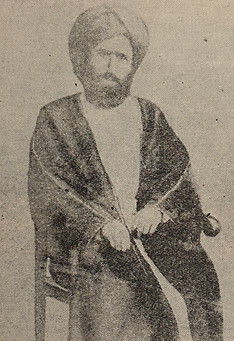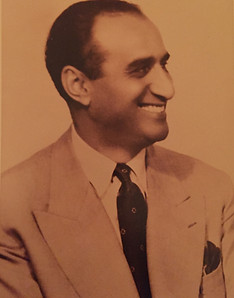EMIRATE OF
MOHAMMERAH


The Rulers of Mohammerah
17TH CENTURY
18TH CENTURY
19TH CENTURY
20TH CENTURY
21ST CENTURY
(1680 - 1684)
Sheikh Rahma bin Khaz’al
(1684 - 1720)
Sheikh Kasib bin 'Obood
Sheikh of Sheikhs of the Muhaisin Confederation of the Bani Ka'ab
(1720 - 1740)
Sheikh Ali ibn Kasib
Relation to predecessor: Son
Sheikh of Sheikhs of the Muhaisin Confederation of the Bani Ka'ab
(1740 - 1786)
Sheikh Mirdao ibn Ali
Emir of Mohammerah
Relation to predecessor: Son
Sheikh Mirdao was the founder of Mohammerah and the Emirate that bore its name, hailing from the Al Bu Kassib branch of the Bani Ka'ab. Initially a vassal to his cousins, the Al Bu Nasser of Fallahiyah, Mirdao gradually expanded his influence, solidifying his branch as the dominant power along the Shatt al-Arab and in southeastern Mesopotamia. The meaning of the word "Merdaw" in Arabic dictionaries is "Lion of the Desert."
Merdaw was a young man when his tribe migrated to Mohammarah, and his rule lasted for 48 years. He was not wealthy but was known for his excellent management, sharp mind, and sound judgment. He was beloved by the people, who were drawn to him, and throughout his rule, he dedicated himself to serving others and responding to the needs of those in distress. Whenever he traveled, he would be accompanied by 500 cavalry men, and the tribes would marvel at how he could provide for them. He had several sons, the most notable of whom were two who ruled after his death, Yusuf and Jaber.
It was during the reign of his son, Jabir, that the title of 'Shaikh of Shaikhs' within the Bani Ka'ab passed to the Al Bu Kassib branch, a title they have retained to this day. Mirdao died in Nejd (present day Saudi Arabia) and was buried there.
(1786 - 1833)
Sheikh Yusuf ibn Mirdao
Emir of Mohammerah
Relation to predecessor: Son
Sheikh Yusuf was the eldest son of Mirdao and succeeded his father upon his death. He continued his father's legacy of growing Mohammerah and its dependencies. Yusuf died in 1833 having bore one son, Ahmed. Ahmed, too young to assume the position of ruler was bypassed and the throne was passed onto to Yusuf's brother, Jabir.
(1833 - 1881)
Sheikh Jabir Khan ibn Mirdao, Daulat Jah, Nusrat Al-Mulk
Emir of Mohammerah
Relation to predecessor: Brother
Sheikh Jabir ibn Merdaw was one of Mohammerah's most astute rulers. Renowned for his diplomatic and military skill, he adeptly navigated the complex political terrain between the Qajar dynasty of Persia and the Ottoman Empire, safeguarding the autonomy of his people. Under his leadership, the second Ka'abide state was established, with Mohammerah as its headquarters, while the old ruling family of the Banu Ka'b tribe (a cousin branch of the Al Merdaw family, based in Fallahiyah) came to answer to him. Upon his death, his son, Sheikh Miz’al, succeeded him and continued to build on his father's legacy, further consolidating the family's influence in the region.
(1881 - 1881)
Sheikh Muhammad Khan ibn Jabir Khan
Emir of Mohammerah
Relation to predecessor: Son
Sheikh Muhammad ascended to the leadership of Mohammerah following his father’s death, but his reign was short-lived. He was peacefully succeeded by his brother, Miz'al, and allowed to retire to the family estates in Basrah where he lived the remainder of his life.
(1881 - 1897)
H.H. Sheikh Miza’al Khan ibn Jabir Khan, Mu’izz us-Sultana
Emir of Mohammerah
Relation to predecessor: Brother
Sheikh Miz'al ibn Jabir (also known as Maz'al ibn Jabir) served as the Sheikh of Mohammerah from 1881 until his death in 1897. He was the son of Sheikh Jabir Khan Ibn Merdaw and succeeded his brother Muhammad, who's reign was short lived. Miz'al's reign was marked by efforts to maintain the autonomy of his people amidst the geopolitical dynamics of the time. In 1897, Miz'al was assassinated, with reports indicating that the act was orchestrated by his cousin, Salmān bin Mansūr. Following his death, Miz'al was succeeded by his younger brother, Khazal Khan
(1897 - 1936)
H.H. Sheikh Khaz’al Khan ibn Jabir Khan, Sardar Aqdas,
Nusrat Al-Mulk, Mu’izz us-Sultana, Sardar-i-Arfa
The Sultan of Mohammerah
Relation to predecessor: Brother
The reign of Sheikh Khaz'al is often regarded as the golden age of Arabistan. Under his leadership, the region flourished, attracting the attention not only of the Qajars and the Ottomans, but also the European empires, who coveted the lands east of the Shatt al-Arab. He came to be know as the 'Sultan of Mohammerah'.
In 1903, Sheikh Khaz'al secured an imperial declaration from the Qajar emperor, Mozaffar-ed-din Shah, which officially recognized that the lands of Arabistan belonged to him, his successors, and his tribes. While the region had already been effectively independent by that time, this formal declaration was a significant acknowledgment, one that had never before been made by either the Ottoman or Persian governments regarding Arabian leadership in south-eastern Mesopotamia.
Khaz'al was a strong backer of Arab unity and independence movements—he supported the early efforts for the independence of Kuwait and Nejd, providing both political backing and financial assistance. His generosity was legendary across the Arabian Gulf; The founder and president of the United Arab Emirates, Shaikh Zayed bin Sultan Al Nahyan, once remarked that “Sheikh Khazaal was the Sheikh of Sheikhs of the Arabian Gulf and he used to financially support the other rulers of the Gulf during the days of poverty before oil.” True to this, he extended financial aid to struggling traders in Kuwait and Dubai, helping to sustain local economies in an era of hardship and scarcity. His actions made him a central figure in shaping the early modern history of the Gulf, earning him deep respect and lasting recognition among Gulf Arab leaders.
After the First World War, Iraq found itself in need of a monarch, and Sheikh Khaz’al emerged as a strong and promising candidate. He had the support and loyalty of the people in southern Iraq, where his influence was considerable, and his leadership was highly respected. Seeking a much greater role for himself and his descendants, Khaz'al sought the throne of Iraq in 1920. In the event, the British imperialists, intent on rewarding the Hashemites for mounting the Arab Revolt with Lawrence of Arabia, installed Faisal I and angrily did nothing to advance Khaz'al's ambitions.
Khaz'al was renowned for a wide range of influential and humanitarian acts during his reign. Notably, he granted refuge to Chaldean Christians who had suffered death or deportation during the Assyrian Genocide, offering them protection and land—an extraordinary act in a region often marked by sectarian strife. The Pope, deeply moved by Khaz’al's compassion toward those afflicted among the children of the Church, honored him with the Order of St. Gregory the Great at the rank of Knight Commander, expressing gratitude and recognizing “…the grace of this great and generous Arab King.”
(1936 - 1991)
H.H. Sheikh Abdullah Khan ibn Khaz'al Khan, Sardar Ashraf
Emir of Mohammerah
Relation to predecessor: Son
Sheikh Abdullah began his early career representing his father as Governor of Mohammerah and Abadan which had begun there conversion into major oil-producing regions soon after oil was first struck there in 1908. In the early 1920s Sheikh Abdullah mediated between the local community and the foreign oil companies and ended several disputes by deporting the workers' dissident Sikh Leaders to Indian while persuading the Anglo-Persian Oil Company (APOC) to raise wages.
Abdullah was still young when the Persian occupation of Arabistan occurred in 1925. That same year, after the kidnapping of their father, Sheikh Khaz’al, Abdullah’s older brother Kasib—who had been the crown prince until his removal by their father and subsequent deportation—assumed leadership of the family and the tribes. Kasib began planning military offensives, hoping the British government would once again align with the Arabs against the Persian regime. However, after a period of struggle, Kasib ultimately renounced his position in favor of Abdullah, his younger brother, who took up the mantle of leadership and sought to restore Arab rule in Arabistan.
Despite numerous failed attempts to reclaim their country—thwarted by shifting allegiances and Britain’s ongoing support for the Persian government—Abdullah eventually withdrew from politics. The heir to the once ancient land of Elam spent the remainder of his life between Iraq and Kuwait, far from the political turbulence that had once defined his struggle for Arabistan’s independence.
Abdullah is regarded as the last Arab ruler of Mohammerah. Until his death, he retained the titles of the Emir of Mohammerah, the Sheikh of Sheikhs of the Bani Ka'b and the Muhaisin tribal confederation—titles that have been passed down through his family and remain with them to this day
(1991 - 2022)
H.E. Sheikh Ali bin Nader bin Abdulmajeed bin Khaz'al of Mohammerah
Relation to predecessor: Grandson
Head of the family of Sheikh Khazaal Ibn Jabir and the Head of the ruling house of Al-Merdaw. Sheikh of Sheikhs of Bani Ka'ab and the Muhaisin tribal confederation.
(2022 - )
H.E. Sheikh Abdullah bin Haidar bin Nader bin Abdulmajeed bin Khaz'al of Mohammerah (Abdullah Al Sheikh Khazaal)
Relation to predecessor: Nephew
Sheikh Abdullah is the current head of the family of Sheikh Khazaal Ibn Jabir and the ruling house of Al-Merdaw of Mohammerah, and holds the title of Sheikh of Sheikhs of the Bani Ka'ab and the Muhaisin tribal confederation. He succeeded his uncle, Sheikh Ali, in October 2022, following Sheikh Ali’s decision to step down in Abdullah’s favor.






